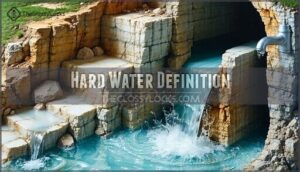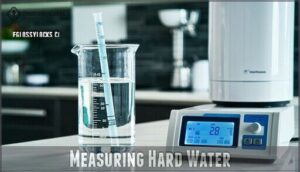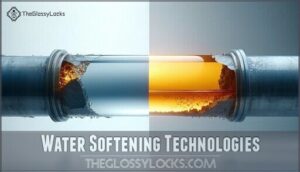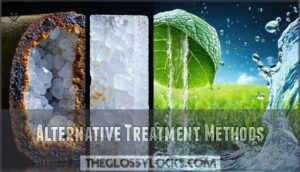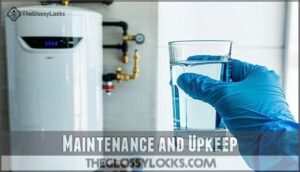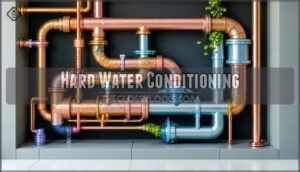This site is supported by our readers. We may earn a commission, at no cost to you, if you purchase through links.
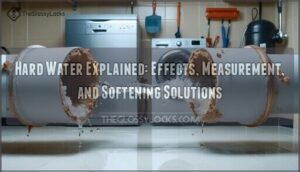 Hard water contains high levels of minerals, primarily calcium and magnesium, that you’ll notice through stubborn limescale on fixtures and appliances.
Hard water contains high levels of minerals, primarily calcium and magnesium, that you’ll notice through stubborn limescale on fixtures and appliances.
You’re dealing with hard water if your soap doesn’t lather properly, dishes have spotty residue, or your skin feels dry after showering.
While these minerals aren’t harmful to your health—in fact, they contribute small amounts to your daily nutrition—they can reduce appliance lifespan and efficiency.
Water hardness is measured in grains per gallon (gpg) or parts per million (ppm), with levels above 7 gpg considered problematic.
The science behind softening this mineral-rich water is simpler than you might think.
Table Of Contents
- Key Takeaways
- Hard Water Definition
- Hard Water Effects
- Measuring Hard Water
- Hard Water Solutions
- Hard Water Conditioning
- Frequently Asked Questions (FAQs)
- What makes water hard?
- How to identify if you have hard water?
- What is hard water?
- Is water hard or soft?
- Is hard water safe to drink?
- How does hard water affect gardening and plant growth?
- Can hard water stain colored fixtures?
- Does boiling hard water reduce hardness?
- How does hard water affect pets?
- Can hard water damage plant growth?
- Conclusion
Key Takeaways
- You can spot hard water by soap that won’t lather, chalky spots on dishes, clogged fixtures, and dry skin or hair after washing.
- Hard water contains calcium and magnesium that are safe to drink but can damage appliances, clog pipes, and reduce cleaning efficiency.
- Options like water softeners or conditioners help tackle mineral buildup, protecting plumbing, appliances, and your skin and hair.
- Regular maintenance of water softeners, like resin cleaning and salt replenishment, ensures they work efficiently and last longer.
Hard Water Definition
Hard water is simply water that contains higher levels of minerals, mainly calcium and magnesium.
These minerals come from the water passing through rock formations like limestone or gypsum, adding a bit of "hardness" to your everyday water.
Composition and Mineral Content
Hard water gets its mineral content from calcium and magnesium, with these hard water minerals coming from rocks like limestone and gypsum.
The mineral ratios can vary by region due to geological differences, impacting water hardness levels.
These ion types cause buildup in pipes and appliances but also provide natural calcium sources.
Regional variations play a significant role in mineral content.
Shaving with hard water can lead to soap scum formation.
Calcium and Magnesium Levels
Calcium and magnesium are the heavyweights of hard water minerals, directly linked to its mineral concentration.
These geological sources like limestone and chalk boost levels, influencing regional variations.
Testing methods reveal their health implications.
- Calcium strengthens bones but leaves mineral buildup in plumbing.
- Magnesium supports heart health yet clogs pipes.
- Knowing levels helps manage hard water’s impact effectively, which is crucial for maintaining a healthy environment and plumbing system.
Comparison to Soft Water
Imagine washing your hands—if it feels like a film’s left behind, you’ve got hard water.
Unlike soft water, which excels in lather quality and cleaning efficiency, hard water’s higher mineral content, rich in calcium and magnesium, contributes to plumbing effects like clogged pipes.
Soft water boasts fewer health impacts but may taste slightly salty due to water softening.
Hard Water Effects
Hard water can leave your pipes clogged, your appliances working harder, and your skin feeling less than its best.
Hard water slows down your home, clogs your pipes, and leaves your skin yearning for relief.
It’s the minerals like calcium and magnesium behind these frustrating and sometimes costly effects.
Impact on Appliances and Plumbing
Over time, scale buildup from hard water can clog pipes, reduce water flow, and lead to costly plumbing problems.
Water heaters, dishwashers, and washing machines suffer efficiency reduction, shortening their appliance lifespan. Limescale coats surfaces, causing appliance damage and increasing repair costs.
Regular maintenance using a limescale removal product can mitigate these issues.
Addressing plumbing buildup early prevents severe damage and keeps your home running smoothly without breaking the bank, which is a key aspect of maintaining a home’s overall efficiency and avoiding costly repairs.
Skin and Hair Concerns
Dry skin? Blame soap scum from hard water.
Its minerals clog pores, causing dryness and worsening issues like eczema.
Hard water effects on hair include dullness, dry scalp, and even hair breakage, thanks to mineral buildup.
Solutions? Clarifying shampoos and chelating body washes. They help fight these struggles and leave your skin and hair feeling refreshed.
Health Benefits and Risks
While hard water provides minerals like calcium and magnesium, boosting cardiovascular health and improving mineral intake, it’s not without concerns.
Its health effects include potential dry skin conditions, which impact skin care routines.
Meanwhile, soft water’s sodium concerns and lead leaching risks highlight the balancing act between benefits and drawbacks, ensuring informed choices for hair care and overall wellness.
Measuring Hard Water
You can measure water hardness using precise scales like grains per gallon or milligrams per liter.
Knowing your water’s hardness level helps you decide if treatment or a softening system is necessary.
Grains Per Gallon and Other Scales
Grains per gallon (GPG) is the go-to unit for water hardness measurement in the U.S., equating to 17.1 ppm of calcium and magnesium.
Comparing scales like GPG or PPM helps guarantee measurement accuracy, especially with regional variations in water.
A clear understanding of these hardness units makes picking the right water treatment easier, saving headaches and plumbing costs.
Using EDTA for binding minerals can further improve water quality.
Water Hardness Classification
Water hardness levels are classified by mineral content, especially calcium and magnesium, using the Hardness Scale Ranges.
Here’s the breakdown:
- Soft: 0–60 mg/L
- Moderately Hard: 61–120 mg/L
- Hard: 121–180 mg/L
- Very Hard: Above 180 mg/L
Regional Hardness Variation highlights how geology affects classification accuracy and testing method comparison, ensuring precise results.
Hard Water Solutions
You’ve got options regarding tackling hard water, from advanced water softening systems to simple treatment methods.
Understanding these solutions helps you protect your plumbing, appliances, and even your skin from the effects of mineral buildup.
Water Softening Technologies
In the context of water softening technologies, you’ve got options like Ion Exchange systems, Reverse Osmosis, Lime Softening, and Chelation Methods.
Ion Exchange swaps hard minerals with sodium, while Reverse Osmosis filters them out entirely.
Alternative systems, like magnetic water softeners, prevent buildup.
Many homeowners find success with complete softener systems, and each water softener system works uniquely, so picking one depends on your home’s specific needs, considering the complete softener systems available.
Alternative Treatment Methods
Looking for hard water fixes without sodium? You’ve got options:
- Potassium softeners swap minerals without adding sodium, great for health-conscious folks.
- Magnetic treatment uses magnets to prevent scale—simple, no chemicals!
- Citric acid and chelation methods naturally bond unwanted minerals.
Each method’s unique. Hard water can also lead to increased hair breakage.
Weigh cost, effectiveness, and water softening environmental impact to pick what suits you!
Maintenance and Upkeep
Don’t skip water softener upkeep! Resin cleaning guarantees performance, while salt replenishment keeps softening smooth. Choose potassium alternatives for lower sodium.
Regular maintenance prevents costly system lifespan issues. Maintaining peak performance requires high quality resin.
For water softening troubleshooting or repairs, professional servicing helps. Here’s a quick breakdown:
| Task | Frequency | Cost Estimate |
|---|---|---|
| Resin Cleaning | Every 6 months | $20–$50 |
| Salt Replenishment | Monthly | $5–$30 |
| Professional Servicing | Annually | $150–$300+ |
The provided maintenance schedule is crucial for smooth operation and to prevent costly issues. By following these guidelines, you can ensure your water softener operates at its best, providing you with high quality water.
Hard Water Conditioning
You can improve hard water’s impact without fully eliminating its minerals using conditioning techniques.
These methods don’t soften water but adjust its properties, reducing scale buildup and making it less disruptive to your home, which improves the overall water quality.
Benefits of Conditioned Water
Conditioned water offers big perks for your daily routine.
You’ll enjoy:
- Healthier skin and softer hair, as fewer minerals strip natural oils during bathing.
- Efficient cleaning with better soap lathering, leaving dishes, laundry, and surfaces spotless.
- Energy savings and extended lifespan for appliances, thanks to reduced scale buildup.
These water softening benefits make life cleaner, smoother, and a little less stressful!
Selecting The Right System
Choosing a water softener? Start by measuring your home’s water usage.
Factor in system capacity, maintenance needs, budget considerations, and space requirements.
A small unit may cost less but struggle with demand.
High-usage households benefit from larger systems despite higher water softening costs.
One sign of hard water is increased hair breakage.
| Factor | What to Examine | Why It Matters |
|---|---|---|
| System Capacity | Fits water usage | Guarantees performance |
| Maintenance Needs | Time and cost | Simplifies upkeep |
| Budget Considerations | Initial and ongoing costs | Balances affordability |
When selecting a water softener, consider maintenance needs and budget considerations to ensure the chosen system meets your household’s requirements.
Economic and Environmental Impact
Switching to a water softener isn’t just about convenience—it’s about savings.
Hard water strains appliances, shortens their lifespan, raises energy consumption, and increases your water bill.
Limescale buildup leads to plumbing repairs, while inefficient cleaning ups soap usage and water waste.
Consider water softening costs an investment in maintaining cleaning efficiency, lowering infrastructure costs, and protecting both your wallet and the environment.
Frequently Asked Questions (FAQs)
What makes water hard?
Like a rock dissolving into tea, water becomes hard when it percolates through mineral deposits.
Your water’s hardness comes from high levels of calcium and magnesium ions it absorbs from limestone, chalk, or gypsum.
How to identify if you have hard water?
You’ll notice soap that doesn’t lather well, mineral stains on fixtures, spotty dishes after washing, scale buildup in kettles, and dry skin after showering.
Test strips can confirm your water’s hardness level.
What is hard water?
Hard water is your home’s silent mineral carrier, containing high levels of calcium and magnesium.
You’ll notice it leaves spots on dishes, creates soap scum, and can reduce your appliances’ efficiency over time, which are all issues caused by hard water.
Is water hard or soft?
Water isn’t inherently hard or soft—it’s classified based on mineral content.
Your water’s hardness depends on calcium and magnesium levels.
You’ll know it’s hard if you notice soap scum and mineral deposits forming regularly.
Is hard water safe to drink?
Studies show you’re consuming beneficial minerals with every sip of hard water.
Yes, it’s completely safe to drink, and you’ll get essential calcium and magnesium that may even reduce heart disease risk.
How does hard water affect gardening and plant growth?
Your garden’s soil pH can rise from mineral buildup, causing nutrient deficiencies in acid-loving plants.
You’ll notice white spots on leaves and may need to repot more frequently to prevent calcium accumulation.
Can hard water stain colored fixtures?
Yes, your colored fixtures can and will develop unsightly deposits over time.
The calcium and magnesium minerals in hard water leave behind whitish-gray stains that become more noticeable on darker surfaces.
Does boiling hard water reduce hardness?
Boiling your hard water will only partially reduce hardness.
It removes temporary hardness (calcium bicarbonate) by precipitating calcium carbonate scale, but won’t affect permanent hardness (calcium sulfate and magnesium compounds) that remains dissolved.
How does hard water affect pets?
Your pets’ urinary health may suffer from mineral buildup in hard water, increasing bladder stone risks.
You’ll also notice dry, itchy skin and a dull coat after bathing them in mineral-rich water.
Can hard water damage plant growth?
While approximately 85% of U.S. homes have hard water, it won’t typically damage your plants.
You’ll notice mineral deposits on leaves, but many plants actually benefit from the additional calcium and magnesium in hard water.
Conclusion
Managing hard water is like winning a battle against invisible mineral invaders.
Whether you choose a salt-based softener, electronic descaler, or conditioning system, you’ll extend appliance life, improve soap efficiency, and enjoy softer skin and hair.
Understanding your water’s hardness level lets you make informed decisions about which solution fits your household needs and budget.
With the right approach, hard water challenges become entirely manageable, protecting both your home and comfort.
- https://www.ncbi.nlm.nih.gov/pmc/articles/PMC2265038/
- http://www.who.int/water_sanitation_health/dwq/chemicals/hardness.pdf
- https://www.merriam-webster.com/dictionary/consumption
- https://www.sciencedirect.com/science/article/abs/pii/S0048969781800472
- https://www.usgs.gov/special-topics/water-science-school/science/water-properties-information-topic

